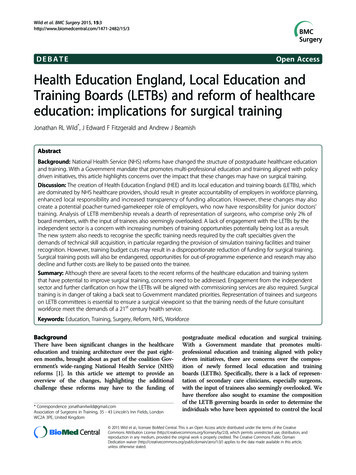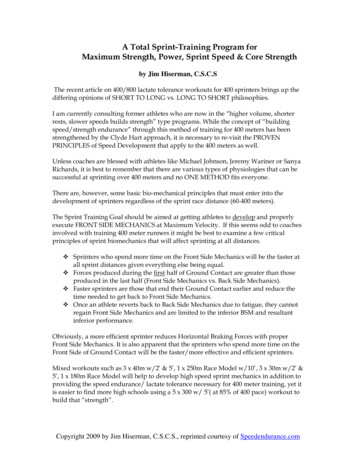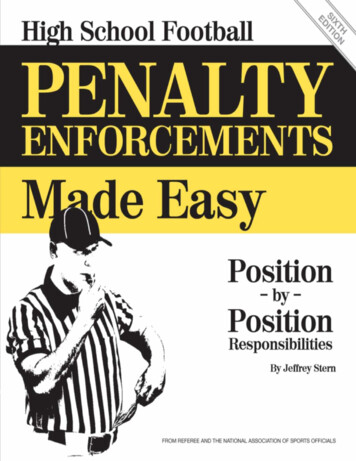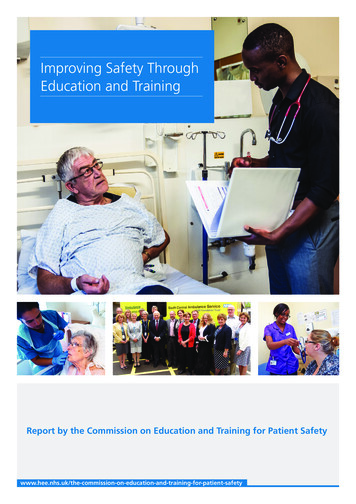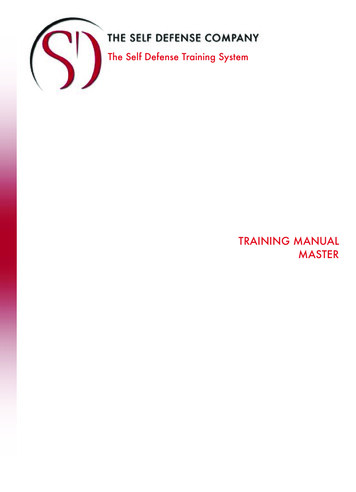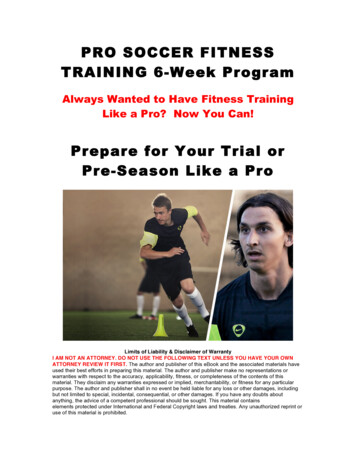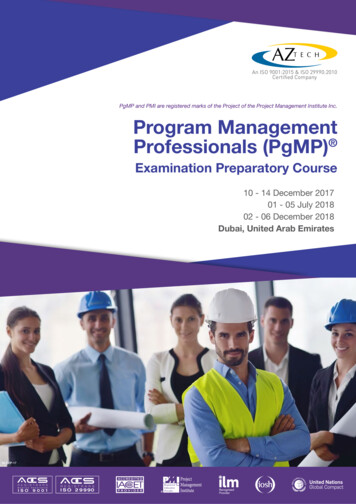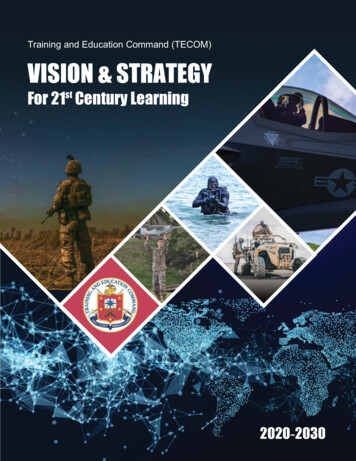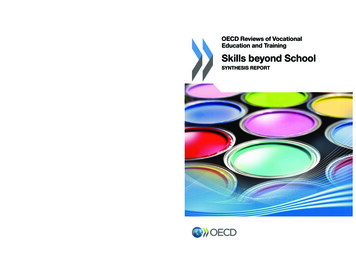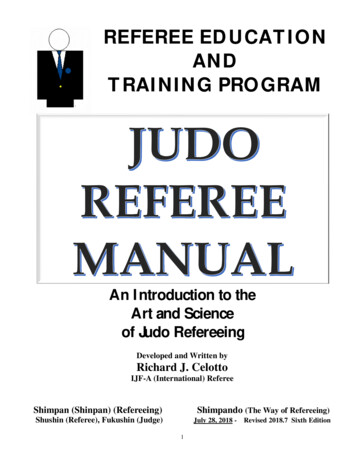
Transcription
REFEREE EDUCATIONANDTRAINING PROGRAMAn Introduction to theArt and Scienceof Judo RefereeingDeveloped and Written byRichard J. CelottoIJF-A (International) RefereeShimpan (Shinpan) (Refereeing)Shimpando (The Way of Refereeing)Shushin (Referee), Fukushin (Judge)July 28, 2018 1Revised 2018.7 Sixth Edition
CONTENTIntroduction1. Basic PrinciplesSafetyContestants are Number 1FairnessConsistency3444442. PrerequisitesKnowledge of the RulesJudo ExperienceCompetitive ExperienceTeaching ExperienceCoaching ExperienceMembershipBackgroundCDC Heads Up!Safe SportReferee Code of EthicLevels of Certification4455555666663. Characteristics7Confidence7Calmness Under Stress7Stage Presence7Deliberateness of Action7Leadership7Flexibility (Adaptability) 8Receptivity8Seek Guidance8Jika no Kansei8Sense of Fair inal Fortitude (Guts) 9Courtesy9Reliability94. Dress and DecorumAppearancePersonal HygieneUniformDecorumBe a Lady or GentlemenBe HumbleNotebook and Pen999911111111QuestionsNever Speak IllAssimilationSpeaking with Coaches111112125. BasicsStartingJudogi ControlScoresScore SpectrumScore BasicsScore RequirementsDegrees of a CircleControlQuick ImpactsHalf and Half LandingsKaeshi WazaRidingLong LandingsBridgingHead DivingKumi kataOsaekomiGray IssuesHoldsToketaChokesArmlocks (Armbars)StoppingSonomamaBasic GesturesCheck the ScoreboardCheck with the 232323232627Non-Verbal Communications 27Remember who Threw/Held28End of ContestEdge: IN or OUTStepping Out vs. PushingNe-waza-EdgeOsaekomi-EdgeLeg Grab/BlockTransition-Leg GrabHanteiTable Judges ProtocolJury (Supervisors)CARE22828292930303131313232Radio InformationRadio Protocol3333Categories of Examination nsProcedureAppreciationPenaltiesDeterminationTeam WorkProtocol343535353536363737373737Position, Mobility, Posture 38Distance38Osaekomi Position38Shime Waza Position39Kansetsu Waza Position 39Osaekomi Spin40Use Entire Contest Area 40Avoid Sightlines40Perpendicular Position40Excessive 41Movement42Collision Avoidance42Sleeping42Wandering Eye42Peripheral Vision42Remain in the Contest Area 42Deliberate Movement42Posture42Judges on the Mat44General Behavior Protocol 44Neutrality44Referee RotationCertification4545
FOUNDATION AND FRAMEWORKINTRODUCTIONWelcome to the challenging and rewarding field of refereeing.This manual is written for the novice referee. It may also be of value to Local, Regional and evenNational Level Referees. I hope that you will read carefully and study the information in this manual.Those coaches and competitors who do not have any intentions of refereeing for some time would stillfind the reading of this manual a valuable exercise in understanding the skills and methodology of areferee. It would help in fighting strategies to understand how the referee functions and what their dutiesand responsibilities are.Your earnest endeavor to learn to referee will result in your continuing improvement in knowledge, skillsand abilities.Working to reach your highest abilities as a referee follows the goal of Jika no Kansei (Strive forperfection) and will continue your efforts to follow the spirit and fulfillment of the principles of Judo.You should seek to provide to the Judo Community services returned for what Judo has provided for you.This meets one of the other principle goals of Judo - Jita Kyeoi (Mutual benefit and welfare).The foundation of your judgment on Scores, Holds, Matte and Penalties is initially developed during yourexperiences as a Judo competitor.You will refine with time your judgment (appreciation) on calling scores, Osaekomi (Holding), theapplication of Matte (Stop) and the application of penalties. You will learn more and more through yourrefereeing peers, and through those with more experience, some of which will become mentors to you.You will also learn from your continued experience refereeing at tournaments. Always seek to improve.You should seek to continue to improve so it is recommended to referee at events that have higher levelreferees willing to serve as mentors and/or teachers to provide feedback and suggestions for improvement.If you referee with mistakes and do not make improvements, then you learn to do those mistakes wellbecause you have practiced them. The referee must make efforts to correct the mistakes prior to thembeing ingrained.This manual contains the basics and a little bit more to get you started in refereeing. There are manytopics you will learn at the clinics and seminars you attend and tournaments you referee.This manual is not designed to teach refereeing from scratch (no knowledge). The NEW referee shouldhave Judo experience and be familiar with the basics. It is very difficult to learn Judo refereeing withoutknowing Judo.Initially, those interested in refereeing should begin making inquiries of their instructor. You shouldpractice calling scores during randori at the club when not playing. It is best if someone else is there toshare your judgments so there can be discussions on which score should be called or when osaekomishould be called or when penalties should be given. It is even better when this is done with your coach ifs/he has the time. It may be more prudent to enlist the services of one of the members of your club who isa certified referee, especially a national or higher.Instructors (Sensei) from time to time should hold mini shiai (tournament) at the end of or part of randoriwhich help train their athletes on tournament etiquette, techniques, coaching communications and therules of a contest but also allow some (you) to practice refereeing and judging in a controlled situation.Always seek guidance and direction from higher level referees. As a referee, you must use common senseand logic to guide you through those areas which have not been outlined or guidance provided untilclarification from a higher source is acquired.
Chapter 1 BASIC PRINCIPLESSafety - The number one concern for a referee is the safety of the competitors. Be sure the environmentand mat area is safe. In the event a competitor is injured, call the medical personnel for their examinationand/or treatment. Do not move the injured athlete!The Contestants Are Number One— Ego and face (reputation) (saving face (one’s honor and prestige))aside, the referee must understand their purpose is to conduct the contest and administer the judgmentfairly. If a mistake is made s/he must ensure that an accurate, fair and honest outcome is achieved and thereferee and judges should listen to the Chief Referee (Jury) when asked to make corrections.Fairness - A referee must avoid any hint of bias either by association or overt or covert acts. Any hint ofbias can be a serious detriment to one’s referee avocation. Everything pales in comparison to theoverlaying principle that the referee MUST ensure a fair and level (even)(figuratively) playing field foreach Judo contest they officiate. The referee must be perceived as honest, fair and unbiased.Most who choose the path of refereeing will generally be brown and in most cases black belts. So mosthave many years of Judo experience before they seriously get involved with refereeing. However, evenGokyu (Yellow) and Yonkyu (Green) mudansha (kyu grade) may begin dabbling in refereeing if theirinstructor has no objection. Some Dojos have their juniors start refereeing at an early age.Consistency – One of the goals of a good referee is to become consistent with correctly calling scores,penalties, osaekomi, toketa and the proper application of Matte under any and all circumstances.Chapter 2PREREQUISITESTo become a referee, one need only be willing to make the effort. It does help though to have knowledgeof Judo. Those with a better understanding of Judo will have an easier time learning to referee. Thosewith competition experience will have even a greater understanding into the less well-defined areas ofrefereeing. If the referee has experienced what the contestants have gone through, then the referee canbetter predict and anticipate the actions of the competitors. This will make them a better referee.If you ever decide to climb the certification ladder to the National Examination you are required to beShodan (First degree black belt), be a certified Regional Referee for one year or more and be 18 years ofage just to name a few of the prerequisites in order to take that examination.Your efforts should be directed to the competitive phase in your early years in Judo. Still most brownbelts starting at Sankyu (third degree brown belt or blue belt) should begin dabbling in the Art and Scienceof Refereeing. Coaches should encourage this. In some Judo clubs, instructors have judoka as young aseight years old practice refereeing during class mini Shiai (tournaments).Knowledge of the Rules - A good knowledge and comprehension of the rules is very important foryour progress as a referee. You must read and study the Judo Refereeing (Contest) Rules. These rules areavailable at the IJF Website Referee Commission documents page or the USA Judo Website Referee Page.Several other Judo Websites have copies of the rules. These copies can be downloaded and printed.Please be sure to use the latest version.Copies of the rules are sometimes available from the Regional Chairpersons and/or Chief Referees. It isimportant that you go over and over the rules. Have other members of your club quiz you on the rules.Have your wife, husband, son, daughter or friend ask you questions when you and they have time. Youneed to know the rules in order to referee. You need a complete copy of the rules to study! The latestcopy of the Judo Rules can be found at the USA Judo Website or the IJF Web Site when available.On those long road trips to tournaments, many referees traveling together go through the rules quizzingeach other during the drive up to a tournament. You do not need to know all the rules to start refereeing.4
You will with time learn to comprehend the rules and then be able to apply them during competition.The Judo Refereeing (Contest) Rules do change from time to time. Sometimes these changes are notwritten into the newer version of the rules for a year or two. Therefore, you must attend clinics by higherlevel International or National referees to gain an understanding of the latest interpretation of the rules.Judo Experience - Judo experience is very important. You should practice Judo on the mat. Youshould actually do the techniques; go through the physical actions of throws and counters, of entries andescapes. You must know Judo from the inside if you want to become a good referee. You must have been“there” so you know what is coming next (anticipation) or the options both contestants have at every stageof their competition. You need to “eventually” know, (when someone refers to Ude hishigi juji gatame orany other Judo technique) what they are talking about.Continue to practice Judo. Continue to attend Competitive Judo Clinics and Techniques Clinics to stay upto date with the latest Judo techniques and competitive strategies. Coaches and high-level competitorsare continually adapting old techniques and setups, resurrecting old setups and entries to throws and holdsand introducing new techniques to competitive judo from Wrestling, BJJ and other martial arts.As a new referee, you are not expected to know the names of all the throws or holds. This will come withtime. You can still learn to referee with a basic knowledge of Judo.Competitive Experience - Competitive experience helps. Higher competitive experience helps evenmore to become a referee. If a new referee has competitive experience s/he will be able to more closelyunderstand the action the contestants take during a contest. This experience helps conduct the contest in amore informed manner.Competitive experience though advantageous, is not always necessary to become a good referee.Competitive experience also helps in understanding the commands, judgments, position and procedures.Having been exposed to the process, most contestants are familiar with the basics of refereeing and judo.Teaching Experience - Teaching Judo techniques, their counters (Kaeshi waza) and combinations(Renraku waza) in conjunction with Katame-waza (Groundwork techniques) helps all referees understandthe sport which we officiate. It makes us better referees. The teaching of gripping and grip breaking,competitive strategies, escapes and entries (set ups) in both ne-waza and tachi waza all contribute toproviding an overall understanding and mastery of Sport (Competitive) Judo. This experience contributessignificantly to develop a Referees understanding of competitive Judo.Coaching Experience - As much as Judo needs referees, Judo needs more coaches and instructors.Many Judo contestants when they retire from competition disappear and abandon their sport. Most ofthose who stay, devote their efforts to coaching or teaching. Some continue on helping keep their originaldojo producing contestants and others venture out on their own and open new Judo Clubs. This needs tohappen more often. After some years as coach, some coaches begin to see the need to get involved inrefereeing. Some see the need to get involved right from the start.80-90% of all referees are instructors/coaches of their own clubs or assistant instructors at larger clubs.Only 10-20% of those who referee are exclusively retired competitors or non-competitive brown andblack belts without their own clubs. Most of them continue to practice Judo.Having a coach’s experience helps one referee. But what is even more important is refereeing helps makeone a better coach.Membership - When you referee at sanctioned tournaments, you must be a member of one of theNational (USA Judo Group A member) Organizations. If you are new or are rated Local, Regional orRegional 1, Regional 2 or Regional 3 then membership in USA Judo, USJA or USJF is necessary.This membership is necessary for legal and insurance reasons.When you attain a National Referee License or higher, then current membership in USA Judo is5
mandatory. It is each individual referee’s responsibility to maintain their membership each and everyyear they serve as a referee. If you are not a member, then your National Referee License is suspended.Each National Referee or higher is encouraged to maintain their membership in either of the other GroupA members that they had been affiliated with during their formative years in Judo.Back Ground Investigation - When you are a certified referee you must always have a BackgroundInvestigation conducted and be on record. This back-ground check must be renewed every two years.This background investigation is also required for all coach certifications and in all organizations, allblack belts must have a valid background investigation.CDC Heads Up Concussion Course - This 30-minute free on-line course is required in someStates for referees and coaches. It is recommended that all referees should take this course and print outthe completion card at the end of the course. This card should be maintained on one’s person (wallet). Asmost referees are also coaches it is logical to take this valuable and informational course.SafeSport – This on-line program (approximately two hours) is also required for referees and coaches.It is a course geared to the safety and protection (physically, socially and emotionally) of competitors.This course covers unethical behaviors of coaches, referees and students with students (participants). Itcovers hazing, emotional, physical and sexual abuse and misconduct among many other topics.Referee Code of Ethics - Please read, comprehend and follow the Referee Code of Ethics. A copy ofthe Code of Ethics can be found on the USA Judo Referee Page under Referee Commission Polices.Levels of Certification - Each State (SGB) has its own Certification System with levels belowNational. States may have one to six levels, similar to mudansha (KYU) grades. Generally, the Juniorand Club levels can be tested for at a Dojo Shiai. Local and higher levels of certification take place atsanctioned tournaments. Check your local State Governing Body (SGB) for Judo or NationalOrganization Referee Commissions (Committees) for details. When one is certified to National, it is likereaching the rank of shodan in refereeing. It is just the beginning to really learn to referee.Each SGB and Group A organization has their own Levels, Age and Rank requirements for each levelbelow National. Below is a chart which “generally” describes the Referee Certification Levels.LEVELS OF REFEREE CERTIFICATIONLevelAgeJuniorClubLocalRegional 1Regional 2Regional 3National2018 (Regional) (PJC-C)*Continental (IJF-B)International (IJF-A)10-1213- NidanSandanTAPL(TIG)(Time AtPrevious Level)0001 year1 year1 year1 year2 years2 years4 ree Commission)SGB/Group ASGB/Group ASGB/Group ASGB/Group ASGB/Group ASGB/Group AUSA JudoPJCIJFIJFPJC Pan-American Judo Confederation, IJF International Judo Federation, SGB State Governing Body (USA Judo Group Bmember), USA Judo Group A (USJA or USJF), N/A Not Applicable*The PJC-C Referee License was discontinued as of 2018.6
Chapter 3CHARACTERISTICSAnyone can become a referee. Those that are not strong in the characteristics identified here can developand/or learn these traits. Over many years we have identified certain characteristics which many of thebest referees possess. These characteristics for the most part have been developed over one’s life time bytheir life experiences, interpersonal interactions, work, play and family environments. The more Judo oneknows the better and faster one can understand the rules and perform as a referee.Confidence - Some new referees already have some confidence from either their workingenvironment or school and home environment. With time, knowledge and practice NEW referees willbecome more and more confident. This is an important characteristic in developing a presence on themat. A good referee must have humble confidence and not step over the line to arrogance.Confidence in refereeing comes from one’s assuredness in knowing and applying the Judo refereeingrules. New referees do not usually have this confidence. It needs to be built up over time. It comes fromcomprehending and applying the rules and more and more refereeing experience at sanctionedtournaments. The referee must become completely comfortable when refereeing.Many high-level competitors have good confidence so when they take up refereeing because of theirabilities and mind set their confidence generally transfers to their refereeing endeavors.Calmness Under Stress - The referee should work on maintaining a calm demeanor whenhandling any situation that occurs on the mat. This is not easy and will take many years to develop. Thiscomes with confidence in the knowledge and application of the rules especially during critical fast actionsituations. This calmness under stress is called equanimity.Stage Presence- One of the hardest traits to build upon is that of presence. New referees must, likean actor, project themselves in a confident and knowledgeable manner. Similar to one who has hadexperience leading, you must project an aura of confident assuredness in your actions.Similar to acting, a good referee should NOT be over dramatic in their actions, just good and unlike actingthe referee must do such a good job as not to be noticed by the coaches and spectators.This balancing act is one of the most difficult facets of referee development that a referee mustincorporate into their repertoire of officiating skills.Initially, new referees shouldn’t think about this category, except that as they get better it will be a traitthat needs to be improved. This is a trait that takes a lot of time to improve upon. Presence comesnaturally with years of refereeing and confidence in one’s knowledge and abilities as a referee. Thoughthere are some techniques to improve one’s presence.Referees who are used to speaking in front of large groups or for example athletes use to performing infront of large crowds already have developed some presence and this can transfer over into refereeing.Deliberateness of Action (Also known as Conviction or Determination) - When adecision is made it must be made quickly and deliberately. There can be no wavering or displays ofconfusion (wishy-washy) when a decision is declared. Do not worry about this in the beginning.We expect new referees to be a little slow in calling scores or osaekomi, etc. It will take time to gainconfidence and show more sureness in one’s calls. In the beginning it is better to be correct and slow,than wrong and fast. The goal is to be correct and fast when making judgment calls.Leadership (Control) - When you are out on the mat you must be in charge.This doesn’t mean beingdomineering (bossy). It means maintaining a dignified Judo like environment. A good referee needs tocontrol without controlling. Just by serving in the position of referee, the competitors allow you tocontrol the contest. The referee must respect the contestants in order for the contestants to continue torespect the referee.7
Flexibility (Adaptability) -A New referee, in fact all referees must be prepared for changing rules andchanging environments. The best referees are very observant and watch the surroundings they are in andadapt to the standards and practices of the indigenous referees so as to meld into that specificenvironment.The new or novice referee generally develops their skills and knowledge in their local State or Region.When the new referee begins expanding their horizons with travel to other States or Regions he/she needsto get accustomed to each regions custom. One would hope that most of refereeing is similar region toregion, but there are sometimes slight differences in the interpretation of the rules.Receptivity - All referees must be open and receptive to learning how to referee and acceptingfeedback. They must be willing to improve. They must learn to receive evaluation, (criticism, feedback)of performance without excuses. Becoming defensive or have what they believe to be valid reasons fordoing something different from that which is expected is not proper etiquette, unless there is a physicalimpediment.Referees when receiving feedback should listen to feedback and then say Thank you. They shouldn’targue with their mentor, referee coach or evaluator. We have experienced instances where the referee hasargued that the way the evaluator is suggesting to do something or interpret something is not correct andthat they the referee knows better. Those types of referees will be marked as difficult to teach, “know itall”. It would be like a Rokkyu (6th Kyu) telling a Rokudan (6th degree black belt) they don’t know whatthey are talking about as it relates to Judo. It just is not done. When this type of situation occurs seniorreferees who have worked with these individuals will be tentative to provide feedback.If you hear an evaluator say something that is not the same or similar to what you have heard before, thenafter listening and thanking the senior referee for their feedback you should when there is a break go toanother more senior referee and make inquiries about that particular situation or interpretation. After thatyou should go to another senior referee and ask them and then another and another. The higher the levelof referee the better. You can just choose to ignore the advice if you believe it is not to yourunderstanding. In most cases it would be foolish and in some cases it might be wise. Time will tell.Seek Guidance (Learning) - A good referee should not only be receptive to feedback (critiqueof judgment and performance) but actively seek it from their peers and more importantly from higherlevel referees. A good referee should not wait for feedback to come to them. They should strongly seekto improve by getting higher level referees constantly providing feedback. That can only occur if you askhigher level referees to provide the feedback. The more constructive and specific feedback you get thefaster learning and skill improvement occurs.If you have a mentor to oversee your learning, this can be very helpful.If you can have someone video yourself when you are refereeing and judging and review yourperformance at home and send it on to a mentor (one willing to review the video) this would also beextremely helpful in improving your performance.At some tournaments with CARE, some referees who are computer literate are bringing a USB flash(Thumb, Stick) drive so that they can down load from the CARE file for that event, their contests as judgeand referee during down time or after the mat closes. In this case the referee needs to know what contestnumbers they were involved with.Jika No Kansei (Strive for Perfection) - Today we call this striving to reach one’s fullestpotential. The referee at all levels must seek to improve oneself by working more tournaments, attendingclinics (Judo and Referee) and seminars, seeking evaluation and feedback and continually sharpeningones’ skills and knowledge.8
Sense of Fair Play - After safety, the fairness of the conduct of each contest a referee is involvedwith must be their highest priority. This may be mentioned several times in different ways in the manualbecause it is so important.Focus (Concentration) - When a referee is on the mat as a referee or serving as a table judge it isvery important that they focus completely on their duties. A loss of focus can cause judgment errors orcreate safety issues.Honesty - As a referee, you must be honest in your duties as a referee of the competitor’s performancesduring competitive contests. No bias whatsoever can be displayed, as it will tarnish your reputation andwill detract from your stated goal of being fair. There can be NO unfair bias either overtly or covertly.Discretion - Be very careful discussing contests you have been involved with, with other referees,coaches or contestants. You can refer to the situations for learning purposes but should not mentionnames. If someone is injured, you should only discuss it with the chief referee, if inquiries are made.Intestinal Fortitude (Guts) - Initially, as a referee this will be difficult to achieve.You must developa high level of confidence in your application of the rules, especially the penalties. This is the ability tocall every call whether it be a score or hold and especially penalty in every contest, without influence bythe caliber of competitors, the competitor’s record (celebrity), the event, environment, home townadvantage or a loud coach trying to affect your decisions.Courtesy - Be polite to everyone even those who are not polite to you.This goes a long way inpresenting to the public the professional demeanor of the referee.Reliability - Once you begin to referee at tournaments you need to make a habit of always being ontime for meetings in the morning. A good referee always is present for their rotation period onto the mat.If you have to leave early, then you will inform the Chief (Head) Referee during the morning meetingbefore mat assignments. It would be more polite and proper to inform the chief referee if one will be lateor have to leave early in one’s email RSVP (acknowledgement) reply to the Chief (Head) Referee orReferee Liaison.If there is a pre-tournament referee invitation by email or letter, you should respond either if you areplanning on being there OR NOT a timely manner. It is the polite thing to do.Chapter 4DRESS AND DECORUMAppearance – The referee who embarks on this quest of refereeing are gentlemen and gentlewomen.The standard accepted societal norms of behavior, appearance and hygiene should apply.This section will cover Appearance, Dress and Behavior. Basically, it is just common sense that oneshould present themselves in a good way.Personal Hygiene - The referee should be clean and without body odor.The hair should be clean and well kept. Men with long hair, or beards and mustaches are fine as long as itis well kept. If it is neat, then it shouldn’t affect your refereeing. Fingernails should be clean and wellkept.Referee Uniform - The standard referee uniform around the world for a referee is the following.Properly fitting gray slacks (pants, trousers) (medium/dark gray in color (charcoal gray)). The refereeshould wear a white short sleeve dress shirt. The short sleeves are for refereeing in warm weather whenthe jacket is allowed to be taken off.The referee should wear a solid black tie. Remember the tip of the tie should touch the top edge of thebelt and not go below the bottom edge of the belt. Special ties with small Judo logos are allowed. The9
base color of the tie should be black. Striped ties or ties with large designs should not be worn.Exceptions will be discussed by one’s local referee authorities. If the tournament organizers provide aspecial tie to ALL the referees then this type of tie is allowed. The referee uniform should be uniform(standardized).A properly fitting black jacket (blazer) is required. The two button variety is preferred over the threebutton. The double-breasted jacket should not be worn. Solid black socks should be worn.Men and women wear the same uniform.You should wear black dress shoes to the venue. When you go onto the mat you should remember whereyou leave your shoes. You may laugh, but inevitably some referee at the end of the tournament is runningaround asking the other referees, did you see where my shoes went.It is best to leave your shoes under the Referee off duty table or Timekeeper’s table on the mat you areassigned to, so they are out of sight
Judo Experience - Judo experience is very important. You should practice Judo on the mat. You should actually do the techniques; go through the physical actions of throws and counters, of entries and escapes. You must know Judo from the inside
